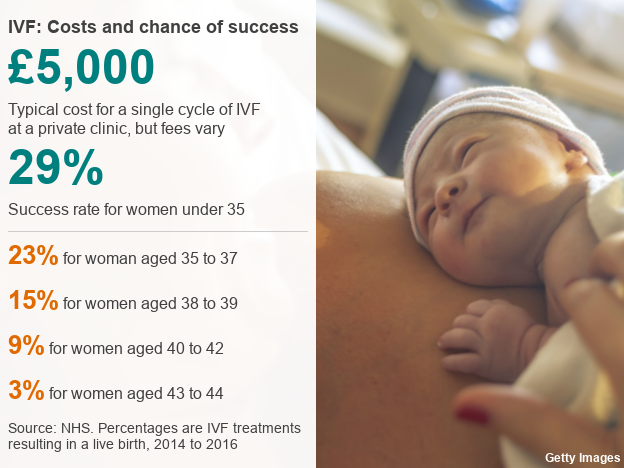IVF: Hope and heartache after nine unsuccessful cycles
- Published
Gillian Herron says it was very difficult to go through years of IVF treatment
This week the world's first "Test Tube Baby", Louise Brown, turns 40.
Born in Oldham General Hospital, she was the first child born as a result of IVF.
Since then around eight million more babies have arrived due to the pioneering treatment.
But, despite transforming the lives of millions, many couples like Gillian Herron and her husband have not found success with IVF, even after nine cycles.
It all started, she said, a number of years ago when her friends were all trying for babies and were getting pregnant.
"We went and had a few tests and found nothing was really wrong at all apart from I had polycystic ovaries," she said.
Polycystic ovary syndrome (PCOS) is a common condition that affects how a woman's ovaries work.
Nine rounds
Gillian started her treatment on a drug called Clomid, a well-known fertility drug.
When it did not work, they turned to the fertility centre at the Royal Victoria Hospital in Belfast.
But while they were waiting for an appointment, Gillian and her husband Joe travelled to Scotland for their first IVF cycle. It did not work.
Louise Brown's 40th birthday has been marked by a new museum exhibition in London
"We just assumed that once you get IVF you're going to get pregnant. It didn't work out that way. We didn't even get to egg retrieval," said Gillian.
Their second IVF round went through the NHS. They succeeded in getting to the egg retrieval stage, but failed to get to fertilisation.
The third cycle did not work.
On their fourth cycle, they did not get pregnant.
On their fifth, they got pregnant, but then had a miscarriage.
"Our sixth cycle we didn't get pregnant. In our seventh, eight and ninth cycles we did get pregnant and had miscarriages," said Gillian.
'We still don't have a baby'
Both Gillian and her husband underwent IVF treatment in Northern Ireland and abroad. When Gillian turned 40, they decided "enough was enough".
"At the end of it, we still don't have a baby," said Gillian.
"We had to draw a line under it at the point of me turning 40 because we just decided that enough was enough.
"We had to re-evaluate our life and realise that life without a baby was going to be OK. But it was a really, really hard process to actually draw a line under.

"Everything in our life had been put towards having a baby and we thought of IVF as this wonderful thing that once you had IVF you were going to have a baby."
Gillian said that the experience has been an "emotional rollercoaster" for both her and her husband, but that their relationship is stronger because of it.
"We're 20 years together. We can cope with anything," she said.
Gillian said they have came to terms with not having a baby. Instead, she is "big fun aunty Gilly" who loves and adores her nieces and nephews.
"You bring them out and take them back and they love you," she said.

IVF in numbers
More than 300,000 babies have been born from IVF treatment in the UK since Louise Brown
The IVF birth success rate grew from 8% in 1991 to 21% in 2016
One in seven couples have trouble conceiving
16% of IVF pregnancies result in twins or more
A woman's fertility tends to decline after the age of 35 and men experience a similar decline after the age of 40
Since 1991, the average age of women receiving IVF treatment has increased from 33.6 to 35.5
Sources: NHS, Human Fertilisation and Embryology Authority
